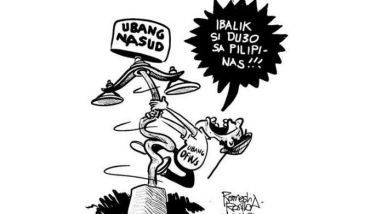Supreme Court as conscience of the nation

I’ve been writing about several nominees to the position of Chief Justice on the belief that the public should know that there exist in our midst men with sterling qualities that make them fit for the job. Many of the nominees are indeed equipped with brilliant minds, and are some of the best and brightest legal luminaries in the country. As the Judicial and Bar Council, and finally, the President, assess their accomplishments, their reputation and integrity will be placed under the strictest scrutiny as well. Choosing the next CJ is no easy job for both the JBC who will submit a shortlist of three candidates for the President’s consideration, and who, in turn will base his choice on this list, and might possibly choose someone outside the list. To my recollection, this is the first time that the appointment of the highest magistrate of the land has aroused unprecedented public interest.
I’m writing about another nominee, Dean Amado Valdez, as having the qualifications and moral integrity befitting the CJ post.
According to a Nobel Prize-winning psychologist, Herbert Simon, a human brain is like a pair of scissors, one blade is the brain and the other blade is the particular environment in which the brain operates. When the human brain had worked in different environments, it sharpens and is more useful with time.
Dean Amado Valdez’ world has touched every conceivable area of critical interest to every Filipino. In a conference in Cambodia, on a chartered flight from Phnom Penh to Siem Reap, the place of the famous Angkor Vat Temple, he was seated with Philippine STAR columnist Satur Ocampo, egging him about the National Democratic Front concentrating on peaceful efforts to fight for reforms through parliament or Congress to end the decade-long insurgency in the country. Many times, he would be huddled with the chairman of the Southern Philippines Development Authority on the best options to attain a lasting peace in the South. When P-Noy talked about judicial reforms in the presence of the former Chief Justice at Manila Hotel, Valdez was the first lawyer to strongly support the initiative of the President.
Recently, he was in Kuala Lumpur as a member of a select group from Australia, Germany, Pakistan, India and Indonesia, to look into the strength and weakness of the electoral system and laws in the conduct of parliamentary elections in Malaysia. He had also personally met the Vice President of China, Xi Jinping, at the Great Hall in Beijing on China’s millennium poverty alleviation programs.
While his educational background is impressive — arts, law, and masteral studies in business economics — his real education that makes him well rounded is learned from life. He started out as a special counsel in the Office of the City Fiscal in Olongapo City in 1970 and thereafter also served a general attorney of the US Seventh Fleet based in Subic Bay until 1977. In 1986, he was cited for his “Barefoot Lawyers Program” as Director of the Bureau of Agrarian Legal Assistance that substantially resolved administrative cases involving tenants and landowners and decongested the clogged dockets at the then Ministry of Agrarian Reform, including the then 31-year-old Meralco-JalaJala agrarian case. He also headed the office of Government Corporate Counsel and likewise served as director of major government and listed corporations in the Philippines. His paper on the Resolution of Conflicts Cases in the Philippines which he delivered in Dublin, Ireland in 2001 remains on file with the World Jurist Association in Washington DC, USA.
When asked about his most fulfilling experience, he cites his stint as national director of the Legal Aid Program of the Integrated Bar of the Philippines where he pioneered such programs as “Decongestion of Jails” and training of Paralegals, as well as his work in the academe. He regularly lectures at the UP Law Center on critical analysis of Supreme Court decisions. Besides being a professorial lecturer in private international law, he also conducts pre-bar and pre-week lectures on the subject in different colleges, including the Ateneo College of Law.
The law deans reelected him for a second term as president of the Philippine Association of Law Schools where he spearheaded the publication of the innovative and pioneering 3-volume PALS Multiple Choice Question Reviewer for the 2011 bar examinations.
The Akamai University of Hawaii recognized his lifetime work by awarding him an honorary doctorate degree in philosophy and community development. He also received an Exemplary Leadership Award at the International Leadership Colloquium in Penang, Malaysia in July 2010. His own alma mater, the University of the East, chose him as one of its 60 recipients of the Outstanding Diamond Jubilee Award, a no mean feat considering that the other 59 are themselves who is who in their respective fields of endeavor in the Philippines. During the centenary of the establishment of ROTC in 2011, the Armed Forces of the Philippines hailed him as one of the 100 outstanding ROTC graduates.
This proud Ulirang Ama awardee has many interests, including writing (Finalist for Best Opinion Column in the 2004 Catholic Mass Media Awards) and broadcasting where he keeps in touch with the daily issues critical to ordinary Filipino lives. His active participation as legal adviser of the Manila Rotary Club, vice-president for academic affairs of the PHILCONSA, and as founding president of the International Association of Constitutional Law in the Philippines completes his seasoning.
According to Valdez, the new Chief Justice must first win the hearts and minds of the people of the judiciary. He advocates the establishment of Integrity Councils in each judicial regions composed of the judges themselves to serve as a peer mechanism to instill discipline and unity of purpose.
He also proposes the establishment of a Constitutional Court that will handle strictly political questions to insulate the court from political tugs of war.
When one listens to him, you can understand the moral story behind every law. He believes that the Supreme Court must serve as the conscience of the people and articulate through their decisions what we are and our visions for the future.
* * *
My e-mail:dominitorrevillas@gmail.com
- Latest
- Trending






















